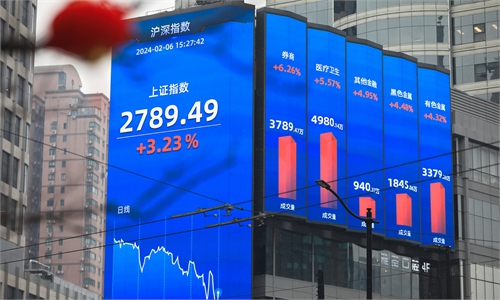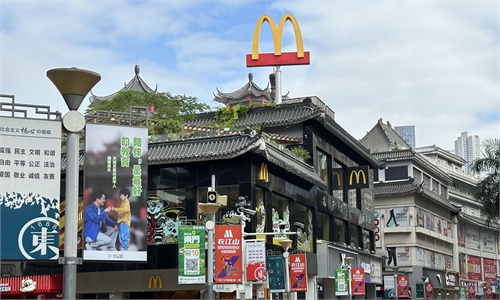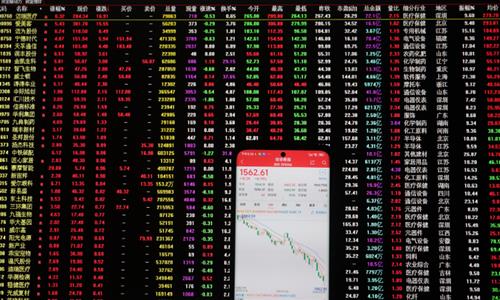
stock market Photo:VCG
China has recently moved to prop up its stock market, in an intensified bid to strengthen investor confidence and shore up domestic buying power that underpins China's overall economic rebound. A wide range of measures are being implemented to encourage institutional and individual stock buying, while stricter restrictions are adopted on stock short selling, in addition to more severe punishment imposed on market frauds, inside trading and other malfeasances.In reality, these measures are necessary, as social media topics related to "stock market volatility" were seen trending on Weibo prior to February 6, when the Shanghai Composite Stock Index dropped to as low as 2,635.09 points.
The stock market was bruised due to multiple factors, and investors faced a challenging period. In the past few years, the Biden administration was relentless in pushing its geopolitical agenda by launching the "decoupling" or "de-risking" campaign, cutting off crucial tech supplies to dozens of Chinese high-tech companies, which negatively impacted the capital market.
Wu Qing, an old hand with a long stint in equity regulation and broker supervision, was appointed as the new chairman of the China Securities Regulatory Commission (CSRC) on February 7. The market soared in the last three trading days before the Chinese Lunar New Year holidays kicked off on February 10.
It is natural and also understandable for the vast Chinese investors to keep hoping for a sustained streak of rallies after the A-share market trading reopens after the Spring Festival holidays. On Monday, the Shanghai composite index rose 1.56 percent to close at 2,910.54 points, and the ChiNext index, tracking China's Nasdaq-style board of growth enterprises, increased 1.13 percent.
Investor morale seems to have already rallied during the Spring Festival holidays, after an IPO aspirant based in Shanghai was found to hand in a prospectus tainted with frauds, and was severely dealt with by the CSRC. Top company executives as well as independent accountants hired by the company were also fined dearly, according to media reports.
The botched IPO case immediately sent shock waves across the whole market. Nevertheless, despite "quiet" IPO withdrawals, the CSRC should organize independent auditors to check their books, and if any frauds are detected, the involved companies and corporate executives must be held accountable in accordance with the law.
To further bolster a capital market rebound, China's monetary authorities could move to reduce the benchmark bank lending rates or LPR (loan prime rate) in the future. A set of well-coordinated macro policy tools are necessary to backstop the market. It is of great importance for the policymakers to rectify market malpractices and overturn the negative market narrative.
Simultaneously, relevant authorities should accelerate efforts to revive the property market in the country through inspiring and stimulating demand for housing. Lately, major Chinese cities including Beijing, Shanghai, Guangzhou and Suzhou have all moved to lessen administrative curbs on new home purchases as well as housing investments in a fresh attempt to reactivate the real estate sector.
The CSRC has just issued a stern warning which reads: "Do not test the law or you will end up picking chestnuts from the fire."
Also, they could continue to push for mergers and acquisitions between listed companies to boost investment value, to guide institutional investors, including social security funds and insurers to increase stock investment and encourage companies to step up share buybacks, and to continue to protect the interests of all market investors, the individual investors in particular.
The author is an editor with the Global Times. bizopinion@globaltimes.com.cn



